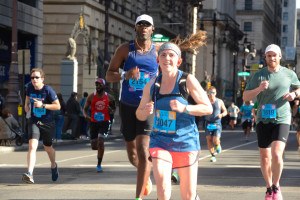Q&A: Philadelphia Marathon Race Director Melanie Johnson
Sunday’s Philadelphia Marathon will be Melanie Johnson’s fourth. But not as a runner—as the race director. Johnson heads the team that ensures the race goes off without a hitch.
She’s never run a marathon—”I have no ambition to run,” she says—but Johnson’s put on her fair share of large-scale events, thanks to a background in public relations and event planning. When she took the reins in 2008, she went on a major fact-finding mission, talking to race directors in other cities about what works and doesn’t when it comes to putting on a marathon. She talked to lots of runners, too, and visited race expos across the country to learn how to do it right.
Her work has paid off: the Philadelphia Marathon has increased by about 3,000 runners since 2008. This year’s race will see the biggest turnout yet: 25,000 runners from Philly and around the world. Organizers are expecting around 50,000 to turn out to watch.
We talked to Johnson about what it’s like putting on such an enormous race—what goes into it, what aspects are the most challenging, what keeps her up at night. And we found out what runners can expect out of this year’s race.
Why did managing the Philadelphia Marathon appeal to you back in 2008?
I’m Philadelphia’s city representative. My job is to organize and put on events that really put the city on the center stage, highlighting everything we have to offer. The Philadelphia Marathon is one of the city’s premier events for this because we attract so many visitors from around the world. We have runners from all 50 states and 40 countries, and we’re very popular here in our region and along the eastern seaboard. I think the Philadelphia Marathon has a great reputation in the industry. It’s well run. It’s professionally organized. Runners want a race that won’t cause them stress before they arrive to run 26.2 miles—the run is hard enough. And our course is absolutely beautiful. Because it’s relatively flat, a lot of people do their PRs on this course. That’s a great thing for a runner.
Why is the race always in November?
I can only speculate, but here’s what I think. There are three big races in Philly: the Broad Street Run; the Philadelphia Distance Run (now the Rock ‘n’ Roll Half Marathon); and the marathon. If you think about it in terms of the calendar year, you have Broad Street in May, the half marathon in September and the marathon in November. So for runners, you actually have a build up in training to the actual event of the Philadelphia Marathon. I think that trifecta is what my predecessors were looking for.
When does work start on the race each year?
We work on this year round because it’s such a big project. We give ourselves a breather in December, and then start working on the next race in January. The real crunch time is now, though, in terms of the race coming together. We’ll have our staff meeting to go over the final pieces this week. Everyone will give their reports: Did you work on this? How many volunteers do we still need? That sort of thing. I love seeing every piece slotted. It’s sort of like the pieces of a puzzle coming together. At this point, the marathon looks like a thousand-piece puzzle, but by the time the expo starts on Friday, the pieces will be arranged exactly where they’re supposed to be.
What’s keeping you up at night right now?
It’s actually not the marathon, believe it or not. There are a lot of things that go on in the Office of the City Representative. We have our tree lighting ceremony right after the marathon, and I worry that we’re spread a little thin at this point in time. I worry about my staff—we’re only eight people. I worry that we’re working on too many things simultaneously.
One of the biggest complaints you hear about marathons is the cost. What does a person’s entry fee cover?
The timing equipment. The medals, T-shirts, food, swag. There are consultants and staffers. Pretty much anything and everything you see and do on race day—that’s because of your entry fee.
What about porta potties?
We’ll have more than 400 on race day. You can never have enough.
Are there any major athletes or celebrities participating this year?
Well, I have a Ryan Reynolds running, but he’s not the Ryan Reynolds you know. Cecily Tynan usually runs. And we have some elites who wil be running. The Olympic trials are this year so we’re getting some Olympic athletes who are still training.
What’s new this year?
As part of our green initiatives, we’ll be composting this year. Not a lot of marathons are doing that right now. It’s a lot of work, it’s additional cost, but it’s a big initiative of the mayor’s so we’re glad to do our part. We’re going to take the 500,000-plus cups discarded by runners along the race route, and turn them into compost the city can use later.


